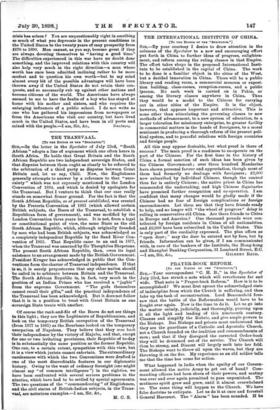THE TRANSVAAL.
[To THE EDITOR OF THE "SPECTATOR."] Srn,—In the letter in the Spectator of July 23rd, "South African" adopts a line of argument which one often hears in South Africa. He holds that Great Britain and the South African Republic are two independent sovereign States, and that disputes between them ought as clearly to be referred to the arbitration of a third party as disputes between Great Britain and, let us say, Chili. Now, the Englishman generally attempts to answer by a reference to that " suze- rainty" which was not expressly mentioned in the London 'Convention of 1884, and which is denied by apologists for 'the Transvaal. But I venture to think that our case really stands on somewhat firmer ground. For the fact is that the South African Republic, as at present established, was created by the Pretoria Convention of 1881 (which allowed certain British subjects, the Boers of the Transvaal, to establish a Republican form of government), and was modified by the London Convention three years later. It is not, from a legal .or constitutional point of view, the same State as the old South African Republic, which, although originally founded by men who had been British subjects, was acknowledged as a completely independent Republic by the Sand River Con- vention of 1852. That Republic came to an end in 1877, when the Transvaal was annexed by Sir Theophilus Shepstone. The present South African Republic, then, owes its legal -existence to an arrangement made by the British Government. President Kruger has acknowledged in public that the Con- ventions form the charter of Transvaal independence. If that is so, it is surely preposterous that any other nation should be called in to arbitrate between Britain and the Transvaal. The South African Republic is, in fact, very much in the position of an Indian Prince who has received a "jaghir " from the supreme Government. " The gods themselves ,cannot recall their gifts," and the practical independence of the Transvaal has been acknowledged. But it does not follow that it is in a position to treat with Great Britain as one sovereign State treats with another.
Of course the rank-and-file of the Boers do not see things in this light ; they are the Legitimists of Republicanism, and look on the temporary British occupation of the Transvaal (from 1877 to 1881) as the Bourbons looked on the temporary usurpation of Napoleon. They believe that they won back 'their independence by the victory of Majuba, and that, except for one or two irritating provisions, their Republic of to-day is in substantially the same position as the former Republic.
'One can, to a certain extent, sympathise with this view, but it is a view which jurists cannot entertain. The extraordinary 'carelessness with which the two Conventions were drafted is one of the most discreditable features in our diplomatic history. Owing to the want of ordinary foresight (one might almost say "of common intelligence ") in the eighties, we have been confronted with several serious problems in the nineties, which have had to be settled by special agreements. The two questions of the " commandeering" of Englishmen, and the civil status of British-Indian subjects, in the Trans- vaal, are notorious examples.—I am, Sir, &c., M. C. S.


































 Previous page
Previous page